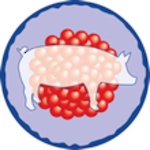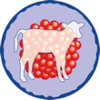ATP01
Parietal cell antigen (H/K-ATPase)
|
Native - Porcine Gastric Mucosa
|
H/K-ATPase
Uniprot ID: P19156 P18434
mRNA RefSeq: NM_214291 NM_001001258 Protein RefSeq: NP_999456 NP_001001258 Autoimmune gastritis is an organ-specific autoimmune disease characterised by type A chronic atrophic gastritis and circulating autoantibodies to gastric parietal cells and intrinsic factor. The end stage of type A chronic atrophic gastritis is pernicious anaemia, a disease which affects predominantly caucasians of north European origin and which is considered to be the most common cause of vitamin B12 deficiency in Western countries.
The prevalences of pernicious anaemia and type A chronic atrophic gastritis in Western populations are estimated to be 0.1 and 1.0 % respectively. Anti-parietal cell antibodies can be detected in the serum of 80-90% of pernicious anaemia patients. Studies have demonstrated that the major molecular targets recognised by parietal cell autoantibodies are the a- and b-subunits of the gastric proton pump (H/K-ATPase). The H/K-ATPase is the most abundant membrane protein of the canalicular and tubovesicular membranes of parietal cells. It catalyses the countertransport of H+ and K+ in an electroneutral fashion at the expense of ATP and is thereby responsible for the acidification of the stomach. Although the H/K-ATPase a-subunit cDNA codes for a protein of molecular weight 114 kDa, it migrates on SDS-electrophoresis as a protein of molecular weight 95 kDa. On the other hand, the b-subunit migrates as a protein of 60-90 kDa, whereas its cDNA codes for a protein of 35 kDa. Extensive glycosylation is presumably responsible for this phenomenon. The amino acid sequence of the human H/K-ATPase is highly homologous to that of the porcine protein. Of the 1,035 residues of the a-subunit, 1,015 are identical with those of the pig enzyme; of the 291 amino acids of the b-subunit, 251 are identical between the two species. It has been demonstrated by several authors that the porcine protein can serve as an effective ELISA substrate for the detection of human anti-parietal cell autoantibodies. Autoimmune Gastritis Pernicious Anaemia Please log in to view certificates of analysis for this item
0
|









